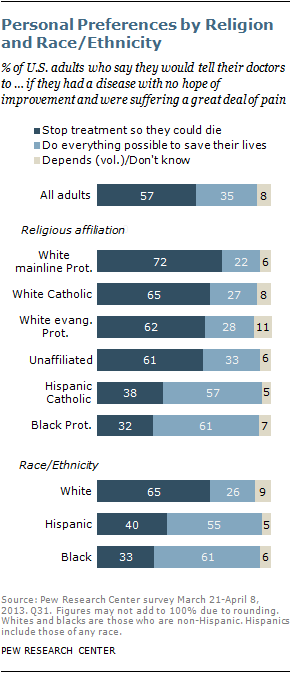The Jahi McMath ”brain death” tragedy continues to unfold from awful to awful, with the family now requesting to have breathing and feeding tubes placed in the girl’s body so that she can be transferred to a continuing care facility.
The family clearly does not trust the hospital and doctors, believing their beloved is being forced off of care when, in their view, she still lives–the law saying that brain dead is dead be damned.
 That got a friend to call me wondering about about how the African-American community–already deeply distrustful of the health care system–will react to Obamacare death panels if (when) they take hold–as so many medical technocrats desire. It’s a very good question.
That got a friend to call me wondering about about how the African-American community–already deeply distrustful of the health care system–will react to Obamacare death panels if (when) they take hold–as so many medical technocrats desire. It’s a very good question.
The Pew Poll (see right) shows that 61% of African-Americans want doctors to “do everything possible to save their lives” when experiencing “a disease with no hope of improvement” and “in a great deal of pain.” So do 55% of Hispanics.
But one of Obamacare’s primary purposes is cost control, which will prevent “everything possible” from being done to extend life through cost/benefit treatment guidelines, insurance regulations, health care rationing, and/or futile care impositions forcing removal of treatment. Obamacarians want the right to coerce, not just educate and persuade.
CLICK LIKE IF YOU’RE PRO-LIFE!
Such Obamacare death panels could well shatter African-American and Hispanic strong political support for liberal agenda items generally. Even if not, it will be very hard to retain their support for the Obamacare technocracy when members see loved ones denied care that they and their family want. So too, I think, the broader community. That’s why the death panel charge cuts so deeply.
The question is: Will that potential shattering be enough to convince death panelists to back off?
LifeNews.com Note: Wesley J. Smith, J.D., is a special consultant to the Center for Bioethics and Culture and a bioethics attorney who blogs at Human Exeptionalism.







